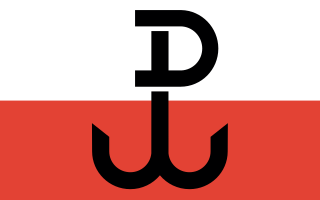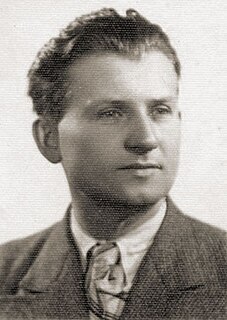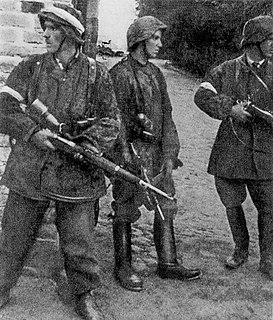
The Home Army was the dominant resistance movement in German-occupied Poland during World War II. The Home Army was formed in February 1942 from the earlier Związek Walki Zbrojnej established in the aftermath of the German and Soviet invasions in September 1939. Over the next two years, the Home Army absorbed most of the other Polish partisans and underground forces. Its allegiance was to the Polish government-in-exile in London, and it constituted the armed wing of what came to be known as the Polish Underground State. Estimates of the Home Army's 1944 strength range between 200,000 and 600,000. The latter number made the Home Army not only Poland's largest underground resistance movement but, along with Soviet partisans, one of Europe's two largest World War II underground movements.

The Ministry of Public Security, commonly known as UB or later SB, was the secret police, intelligence and counter-espionage agency operating in the Polish People's Republic. From 1945 to 1954 it was known as the Department of Security, and from 1956 to 1990 as the Security Service.
The Internal Security Corps was a special-purpose military formation in Poland under Stalinist government, established by the communist Council of Ministers on May 24, 1945.

Freedom and Independence was a Polish underground anticommunist organisation founded on September 2, 1945 and active until 1952.

The "cursed soldiers" or "indomitable soldiers" is a term applied to a variety of anti-Soviet and anti-communist Polish resistance movements formed in the later stages of World War II and its aftermath by members of the Polish Underground State. This all-encompassing term for a widely heterogeneous movement was introduced in the early 1990s.

A public execution in Dębica was carried out in 1946 when three members of the Polish anti-communist National Armed Forces (NSZ) organization, Józef Grębosz, Józef Kozłowski, and Noster Franciszek, were publicly executed by the communist Polish authorities in the market square of Dębica in southeastern Poland.

Łukasz Ciepliński [Polish pronunciation: [ˈwukaʂ t͡ɕɛˈpliɲskʲi]] was a Polish soldier who fought in the Polish anti-Nazi and anti-communist resistance movements. He used various aliases: Pług, Ostrowski, Ludwik, Grzmot, and Bogdan. Ciepliński was executed at Mokotów Prison in Warsaw, with a shot to the back of the head by the Polish secret police, Urząd Bezpieczeństwa.

Major Adam Lazarowicz was a Polish military officer who played a prominent role in the Polish resistance movement in the German-occupied Poland in the Second World War.

On March 1, 1951, the Soviet-controlled Communist Polish secret police, Urząd Bezpieczeństwa (UB), carried out the execution of seven members of the 4th Headquarters of the anti-Communist organization Wolność i Niezawisłość (WiN) in the Mokotów Prison in Warsaw. All those executed were members of WiN who, during World War II, took an active part in anti-Nazi resistance.

Karol Chmiel (1911–1951) was born on 17 April 1911 in the village of Zagorzyce to the peasant family of Antoni and Katarzyna née Charchut. He graduated from high school in Dębica, and was admitted to the prestigious Jagiellonian University in Kraków, where he studied law. After graduation, in 1935, Chmiel settled in Wojslaw, a village near Mielec; his wife Irena Suchodolska was a school principal, and he worked for the Town Hall in Mielec.

Captain Józef Rzepka was born in 1913 in the village of Bratkowice in Austrian Galicia. He graduated from the 1st High School in Rzeszów, then went to Warsaw to study law at Warsaw University.

Captain Franciszek Błażej was born on 27 October 1907 in Nosówka, in Austrian Galicia. He was a professional officer of the Polish Army and participated in the Polish September Campaign. Some time in the early 1940s, he joined the Rzeszów division of the Union for Armed Struggle.

The anti-communist resistance in Poland, also referred to as the Polish anti-Communist insurrection fought between 1944 and 1953, was an armed struggle by the Polish Underground against the Soviet takeover of Poland at the end of World War II in Europe. The guerrilla warfare conducted by the resistance movement formed during the war, included an array of military attacks launched against Communist prisons, state security offices, detention facilities for political prisoners, and prison camps set up across the country by the Stalinist authorities.

Kąkolewnica is a village in Radzyń Podlaski County, Lublin Voivodeship, in eastern Poland. It is the seat of the gmina called Gmina Kąkolewnica. It lies approximately 18 kilometres (11 mi) north of Radzyń Podlaski and 77 km (48 mi) north of the regional capital Lublin.

Marian Bernaciak was a lieutenant in the Polish Army, a member of ZWZ and the Home Army, a major and a legendary leader of an underground partisan unit of WiN in the Lublin region.

Zdzisław Broński - was a reserve officer of the Polish Army, member of ZWZ and the Home Army, one of the partisan leaders of the anti-communist underground Freedom and Independence, WiN, in the Lublin region.
The Amnesty of 1947 in Poland was an amnesty directed at soldiers and activists of the Polish anti-communist underground, issued by the authorities of People's Republic of Poland. The law on amnesty was passed by the Polish Sejm on 22 February 1947. The actual purpose of the amnesty was the liquidation of coordinated resistance to the newly-established communist regime. The promise of amnesty was not kept. Information collected during questioning of the "cursed soldiers" who had revealed themselves led to a later round of arrests and repression, including of those who stayed in hiding.

Franciszek Niepokólczycki alias Teodor, Szubert, Franek, Żejmian, Halny was a colonel of Polish Army. During World War II, commander of the Union of Retaliation, officer of the Union of Armed Struggle and the Kedyw of Home Army. President of the Freedom and Independence from 1945 to 1946 and political prisoner of the Stalinist period.

Emilia Malessa, née Izdebska, was a Polish soldier, member of the Home Army with the rank of Captain, participant in the Warsaw Uprising, member of the underground anti-communist organization Freedom and Independence (WiN), and a "cavalier" of the Order of Virtuti Militari.
The Attack on Hrubieszów was a joint action of the Polish post-Home Army (AK) organization Freedom and Independence (WiN) and the Ukrainian partisans of the Ukrainian Insurgent Army (UPA), which took place on the night of 27 May 1946. It was the most significant joint action carried out by both organizations, which had previously often fought each other, but they decided to co-operate in the face of the common threat from the Polish communists and the Soviet NKVD.














